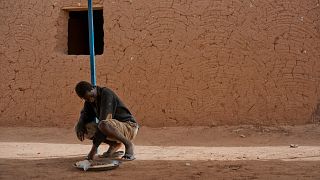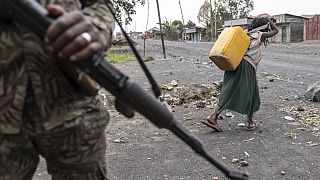Democratic Republic Of Congo
The World Health Organization (WHO) has officially declared the ongoing mpox outbreak in the Democratic Republic of the Congo (DRC) and neighboring African countries a Public Health Emergency of International Concern (PHEIC). This declaration, the highest level of global health alert, underscores the seriousness of the outbreak, particularly the troubling symptoms associated with the virus.
Mpox is a viral illness that usually begins with fever, headache, muscle aches, and swollen lymph nodes. However, the most distinctive and concerning symptoms are the rashes and lesions that develop on the skin. These lesions typically start on the face and hands but can spread to other parts of the body, including the torso and limbs.
The lesions progress through several stages, beginning as flat spots that evolve into raised bumps, filled with clear or yellowish fluid, before eventually crusting over. This entire process can take several weeks. A person infected with mpox is considered contagious from the onset of symptoms until the lesions have fully crusted over, the scabs have fallen off, and new skin has formed.
Transmission of the virus occurs mainly through large respiratory droplets, direct contact with body fluids, skin lesions, or contaminated materials such as clothing or bedding. This makes close physical contact with an infected person, particularly during the stage when the lesions are open or weeping, a significant risk factor for spreading the disease.
Since January 2023, the DRC has reported over 22,000 suspected mpox cases, with more than 1,200 deaths attributed to the virus. The current outbreak is particularly severe due to the spread of Clade I mpox, which is known for causing more severe illness and a higher mortality rate compared to Clade II. This strain is endemic to the DRC but has now spread to neighboring countries, including Burundi, the Central African Republic, the Republic of the Congo, Rwanda, and Uganda.
The outbreak’s rapid escalation and its cross-border spread have raised alarm among global health authorities, leading to the WHO’s decision to declare it a PHEIC. This declaration is intended to galvanize international attention and resources to manage the outbreak, emphasizing the need for a coordinated global response.
In response to the outbreak, Maria Van Kerkhove, WHO’s Director of Epidemic & Pandemic Preparedness & Prevention, stressed the importance of understanding the virus’s transmission patterns and identifying at-risk populations. She highlighted the necessity of using the limited vaccine supply strategically to maximize impact and urged countries with surplus vaccines to donate them to affected regions.
"Understanding the dynamics of transmission and identifying populations at risk are crucial steps," said Van Kerkhove. "This knowledge will help us deploy vaccines in the most effective way possible. We also call on countries with vaccine reserves to come forward and support our efforts."











01:27
Philippines sees 73% surge in dengue cases this quarter
Go to video
Lassa fever kills 118 in Nigeria since the start of the year
05:41
Mobile dialysis unit brings life-saving treatment closer to patients in rural Kenya
04:04
New budget battle looms in South Africa as parties reject VAT increase
02:29
DRC faces setback in fight against mpox amid ongoing fighting in east
04:24
Ebola cases in Uganda rise to 14 as new cluster emerges